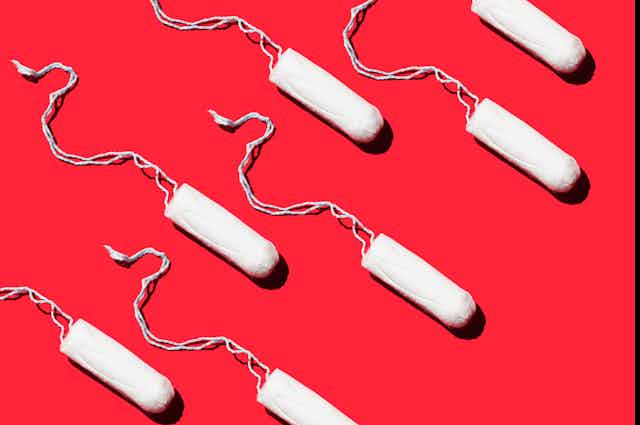About a year ago, at a friend’s wedding, a fellow guest asked whether I knew that modern sanitary towels owe their origins to resourceful World War I field nurses who discovered the efficacy of repurposing military bandages as period pads. I did not.
As a historian interested in the relationship between technology and the body – and someone who menstruates – the conversation had me wondering why I’d never considered the evolution of menstrual products. The answer, I believe, lies in the pervasive culture of shame that has long surrounded menstruation, stifling open dialogue around the subject.
That, I thought, must change. So, I embarked on a research project with a team of colleagues at the University of Leeds into the history of menstrual stigma.
What we’ve discovered so far are examples of stigma and shame surrounding periods from many thousands of years ago through to the modern day.

This article is part of Women’s Health Matters, a series about the health and wellbeing of women and girls around the world. From menopause to miscarriage, pleasure to pain the articles in this series will delve into the full spectrum of women’s health issues to provide valuable information, insights and resources for women of all ages.
You may be interested in:
Five old contraception methods that show why the pill was a medical breakthrough
The orgasm gap and why women climax less than men
Not a new problem
A frequently cited example of menstrual stigma is the Bible’s Leviticus chapter 15, verses 19-33. This passage asserts that women (along with anything they lie or sit on) become “unclean” during menstruation. If a non-menstruating person touches either the menstrual blood, or anything the woman has touched, they too will become unclean.
This association between menstruation and corruption (not just of the menstruating person, but also of people and objects around them) has been persistent among male scholars through history.
For example, writing around AD70, Pliny the Elder says menstruation “is productive of the most monstrous effects”. He writes that crops “will wither and die”, and bees “will forsake their hives if touched by a menstruous woman”.
In the seventh century AD, Isidore of Seville expanded on Pliny’s accusations, claiming:
If they are touched by the blood of the menses, crops cease to sprout, unfermented wine turns sour, plants wither, [and] trees lose their fruit.
Even as late as 1694, we find books on midwifery that liken menstruating women to the cockatrice (a mythical beast with venomous breath) on account of their allegedly shared ability to disperse poison through the air.
From history to today
Unfortunately, discussions of menstruation have continued to reinforce shame around the issue through the 20th and 21st centuries, portraying periods as something to be embarrassed about and to be kept hidden.
In 1950, Good Housekeeping, the popular women’s magazine, published an advert for Modess’ newly packaged sanitary towels, which read: “So skilfully shaped not to look like a napkin box, that the sharpest eyes couldn’t guess what’s inside the wrapping.”
Although the tone of this advertisement is upbeat and chatty, it reinforces the idea that menstrual products should be kept hidden. Some 70 years later, in 2020, Tampax was criticised for advertising tampons that “open silently for full discretion”.
Read more: Solving period poverty is about more than just making products free
Another example of the stigmatisation of menstruation can be seen in the long history of euphemisms. A study published in 1948 identified a range of harmful menstrual euphemisms including “the curse”, “dirty red” and describing a woman as “in season”.
A similar study from 1975 discussed 128 menstrual euphemisms, many of which are still used today (such as “Aunt Flo” and “on the rag”). While some of these euphemisms might provoke a giggle (my personal favourite being “riding the cotton pony”), they’re designed to obscure discussions of menstruation and, in doing so, they reinforce the shame that surrounds it.
The harms of stigma
This long history of menstrual stigma continues to inform contemporary culture, having a negative effect on people who menstruate today. In 2021, a group of researchers concluded that feelings of stigma and shame perpetuate the expectation that people should hide their menstruation.
This may take the form of hiding sanitary supplies at school and at work, or concealing symptoms of menstruation, for example.

We know this secrecy prevents people from identifying when their experiences of menstruation are unusual and from subsequently seeking healthcare. For example, a 2018 survey found that 79% of girls and young women had faced symptoms linked to their period that concerned them, but they hadn’t seen a doctor or health professional.
Similarly, statistics from charity Endometriosis UK reveal that 62% of women aged 16-54 would put off going to a doctor with symptoms of endometriosis because they don’t think it’s serious enough to bother a doctor with, or they’d be embarrassed, or don’t think they’d be taken seriously, or think symptoms including painful periods are normal.
What can we do?
Stigma around menstruation is deeply entrenched in society. But there are numerous small actions each of us can take, which collectively can make a significant difference. First of all, we can all (irrespective of age, gender or sexuality) embrace open conversations about menstruation.
We can discard the use of menstrual euphemisms, as continually relying on these perpetuates the notion that this natural bodily function should remain concealed and shrouded in shame.
We can also use our collective voices, for example by engaging with companies on social media, to demand a more truthful portrayal of menstruation in the media (such as, as Kotex has done, banishing the absurdity of using blue liquid to demonstrate their products).
Of course, we also need to do work on a larger scale. We need to tackle period poverty, ensure access to clean water and private toilets, and encourage employers to develop positive menstrual policies.
But we can start by talking. If we can end the secrecy and silence that has long surrounded menstruation, we can begin to create a future that empowers all who menstruate.

